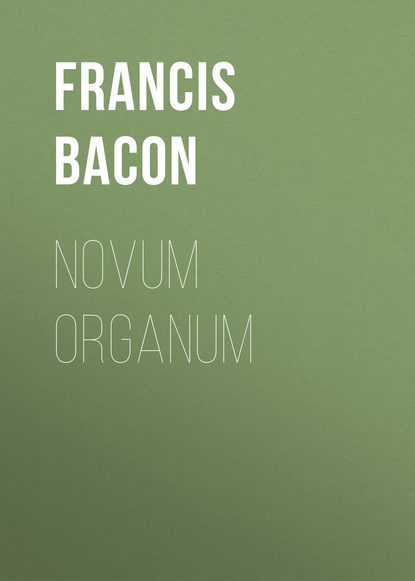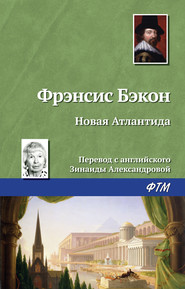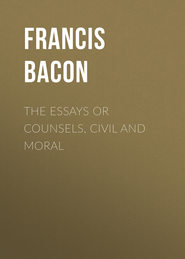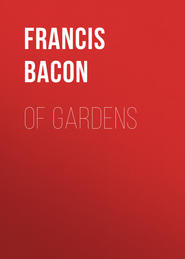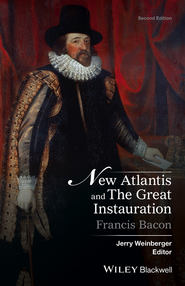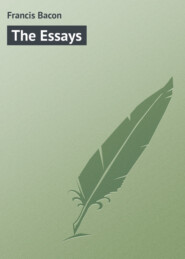По всем вопросам обращайтесь на: info@litportal.ru
(©) 2003-2024.
✖
Novum Organum
Настройки чтения
Размер шрифта
Высота строк
Поля
By spirit, Bacon here plainly implies material fluid too fine to be grasped by the unassisted sense, which rather operates than reasons. We sometimes adopt the same mode of expression, as in the words spirits of nitre, spirits of wine. Some such agency has been assumed by nearly all the modern physicists, a few of whom, along with Bacon, would leave us to gather from their expressions, that they believe such bodies endowed with the sentient powers of perception. As another specimen of his sentiment on this subject, we may refer to a paragraph on the decomposition of compounds, in his essay on death, beginning – “The spirit which exists in all living bodies, keeps all the parts in due subjection; when it escapes, the body decomposes, or the similar parts unite.” —Ed.
80
The theory of the Epicureans and others. The atoms are supposed to be invisible, unalterable particles, endued with all the properties of the given body, and forming that body by their union. They must be separated, of course, which either takes a vacuum for granted, or introduces a tertium quid into the composition of the body.
81
Compare the three following aphorisms with the last three chapters of the third book of the “De Augmentis Scientiarum.”
82
Bacon gives this unfortunate term its proper signification; μετα, in composition, with the Greeks signifying change or mutation. Most of our readers, no doubt, are aware that the obtrusion of this word into technical philosophy was purely capricious, and is of no older date than the publication of Aristotle’s works by Andronicus of Rhodes, one of the learned men into whose hands the manuscripts of that philosopher fell, after they were brought by Sylla from Athens to Rome. To fourteen books in these MSS. with no distinguishing title, Andronicus is said to have prefixed the words τα μετα τα φυσικα, to denote the place which they ought to hold either in the order of Aristotle’s arrangement, or in that of study. These books treat first of those subjects which are common to matter and mind; secondly, of things separate from matter, i. e. of God, and of the subordinate spirits, which were supposed by the Peripatetics to watch over particular portions of the universe. The followers of Aristotle accepted the whimsical title of Andronicus, and in their usual manner allowed a word to unite things into one science which were plainly heterogeneous. Their error was adopted by the Peripatetics of the Christian Church. The schoolmen added to the notion of ontology, the science of the mind, or pneumatology, and as that genus of being has since become extinct with the schools, metaphysics thus in modern parlance comes to be synonymous with psychology. It were to be wished that Bacon’s definition of the term had been accepted, and mental science delivered from one of the greatest monstrosities in its nomenclature, yet Bacon whimsically enough in his De Augmentis includes mathematics in metaphysics. —Ed.
83
“Ne tenues pluviæ, rapidive potentia solis
Acrior, aut Boreæ penetrabile frigus adurat.”
– Virg. Georg. i. 92, 93.
84
This notion, which he repeats again, and particularizes in the 18th aph. (#Book_II_Aph_18) of this book, is borrowed from the ancients, and we need not say is as wise as their other astronomical conjectures. The sun also approaches stars quite as large in other quarters of the zodiac, when it looks down upon the earth through the murky clouds of winter. When that luminary is in Leo, the heat of the earth is certainly greater than at any other period, but this arises from the accumulation of heat after the solstice, for the same reason that the maximum heat of the day is at two o’clock instead of noon. —Ed.
85
Bouguer, employed by Louis XIV. in philosophical researches, ascended the Andes to discover the globular form of the earth, and published an account of his passage, which verifies the statement of Bacon.
86
Montanari asserts in his book against the astrologers that he had satisfied himself by numerous and oft-repeated experiments, that the lunar rays gathered to a focus produced a sensible degree of heat. Muschenbröck, however, adopts the opposite opinion, and asserts that himself, De la Hire, Villet, and Tschirnhausen had tried with that view the strongest burning-glasses in vain. (Opera de Igne.) De la Lande makes a similar confession in his Astronomy (vol. ii. vii. § 1413). Bouguer, whom we have just quoted, demonstrated that the light of the moon was 300,000 degrees less than that of the sun; it would consequently be necessary to invent a glass with an absorbing power 300,000 degrees greater than those ordinarily in use, to try the experiment Bacon speaks of. —Ed.
87
In this thermometer, mercury was not dilated by heat or contracted by cold, as the one now in use, but a mass of air employed instead, which filled the cavity of the bulb. This being placed in an inverted position to ours, that is to say, with the bulb uppermost, pressed down the liquor when the air became dilated by heat, as ours press it upward; and when the heat diminished, the liquor rose to occupy the place vacated by the air, as the one now in use descends. It consequently was liable to be affected by a change in the temperature, as by the weight of air, and could afford only a rude standard of accuracy in scientific investigations. This thermometer was not Bacon’s own contrivance, as is commonly supposed, but that of Drebbel. —Ed.
88
La Lande is indignant that the Chaldeans should have more correct notions of the nature of comets than the modern physicists, and charges Bacon with entertaining the idea that they were the mere effects of vapor and heat. This passage, with two others more positive, in the “De Aug.” (cap. xl.) and the “Descript. Globi Intellect.” (cap. vi.) certainly afford ground for the assertion; but if Bacon erred, he erred with Galileo, and with the foremost spirits of the times. It is true that Pythagoras and Seneca had asserted their belief in the solidity of these bodies, but the wide dominion which Aristotle subsequently exercised, threw their opinions into the shade, and made the opposite doctrine everywhere paramount. —Ed.
89
Was it a silk apron which exhibited electric sparks? Silk was then scarce.
90
The Italian fire-fly.
91
This last is found to be the real reason, air not being a good conductor, and therefore not allowing the escape of heat. The confined air is disengaged when these substances are placed under an exhausted receiver.
92
This is erroneous. Air, in fact, is one of the worst, and metals are the best conductors of heat.
93
See No. 28 in the table of the degrees of heat (#Tab_3_Inst_28).
94
Bacon here mistakes sensation confined to ourselves for an internal property of distinct substances. Metals are denser than wood, and our bodies consequently coming into contact with more particles of matter when we touch them, lose a greater quantity of heat than in the case of lighter substances. —Ed.
95
This was the ancient opinion, but the moderns incline to the belief that these insects are produced by generation or fecundity from seeds deposited by their tribes in bodies on the verge of putrefaction. —Ed.
96
The correct measure of the activity of flame may be obtained by multiplying its natural force into the square of its velocity. On this account the flame of vivid lightning mentioned in No. 23 (#Tab_3_Inst_23) contains so much vigor, its velocity being greater than that arising from other heat. —Ed.
97
The fires supply fresh heat, the water has only a certain quantity of heat, which being diffused over a fresh supply of cooler water, must be on the whole lowered.
98
If condensation were the cause of the greater heat, Bacon concludes the centre of the flame would be the hotter part, and vice versâ. The fact is, neither of the causes assigned by Bacon is the true one; for the fire burns more quickly only because the draught of air is more rapid, the cold dense air pressing rapidly into the heated room and toward the chimney. —Ed.
99
Bacon appears to have confounded combustibility and fusibility with susceptibility of heat; for though the metals will certainly neither dissolve as soon as ice or butter, nor be consumed as soon as wood, that only shows that different degrees of heat are required to produce similar effects on different bodies; but metals much more readily acquire and transmit the same degree of heat than any of the above substances. The rapid transmission renders them generally cold to the touch. The convenience of fixing wooden handles to vessels containing hot water illustrates these observations.
100
Another singular error, the truth being, that solid bodies are the best conductors; but of course where heat is diffused over a large mass, it is less in each part, than if that part alone absorbed the whole quantum of heat. —Ed.
101
This general law or form has been well illustrated by Newton’s discovery of the decomposition of colors.
102
I.e., the common link or form which connects the various kinds of natures, such as the different hot or red natures enumerated above. – See Aphorism iii. part 2 (#Page_110).
103





